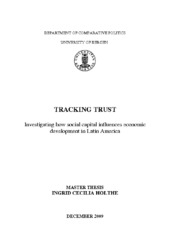Tracking trust - Investigating how social capital influences economic development in Latin America.
Master thesis
Permanent lenke
https://hdl.handle.net/1956/3754Utgivelsesdato
2009-12-04Metadata
Vis full innførselSamlinger
Sammendrag
This thesis investigates how social capital can lead to enhanced economic development through lowering transaction costs and promoting labour productivity and investment. The research question is: How does social capital influence economic development in Latin America? Based on a combination of classical economic theory and social capital theory, three hypotheses concerning the causality between social capital and economic development are made. These suggest that social capital enhance economic development through the lowering of transaction costs (H1), promotion of productivity (H2) and promotion of investment (H3). By investigating these mechanisms, this thesis counters the frequently expressed critique of social capital theory, namely the lack of understanding of this causality. Furthermore, it expands the scope of the social capital theory in a developing context viz. a Latin American one. The existence of a general relationship between social capital, measured as trust, and economic development, measured as growth in GDP, is determined by a regression analysis of 19 Latin American countries. The analysis also reveals Uruguay as the country with the highest value on the variable of interest, social capital. I thus select Uruguay as the case of investigation. The transfer mechanisms are investigated by process-tracing in an in-depth study based on interview data from Uruguayan businesses, where transactions, investment and productivity are crucial activities. The results indicate that trust does have an economic pay-off through the lowering of transaction costs (H1). The effect of trust on labour productivity (H2) is also supported, but seems to be influenced by factors important in a development context, such as socioeconomic security and crime, apparently omitted in social capital theory. The effect of trust on economic development through investment (H3) is not supported by the data. The answer to the research question is therefore that in the Latin American case of Uruguay social capital influences economic development through lowering of transaction costs and through promotion of labour productivity.
Utgiver
The University of BergenOpphavsrett
The authorCopyright the author. All rights reserved
